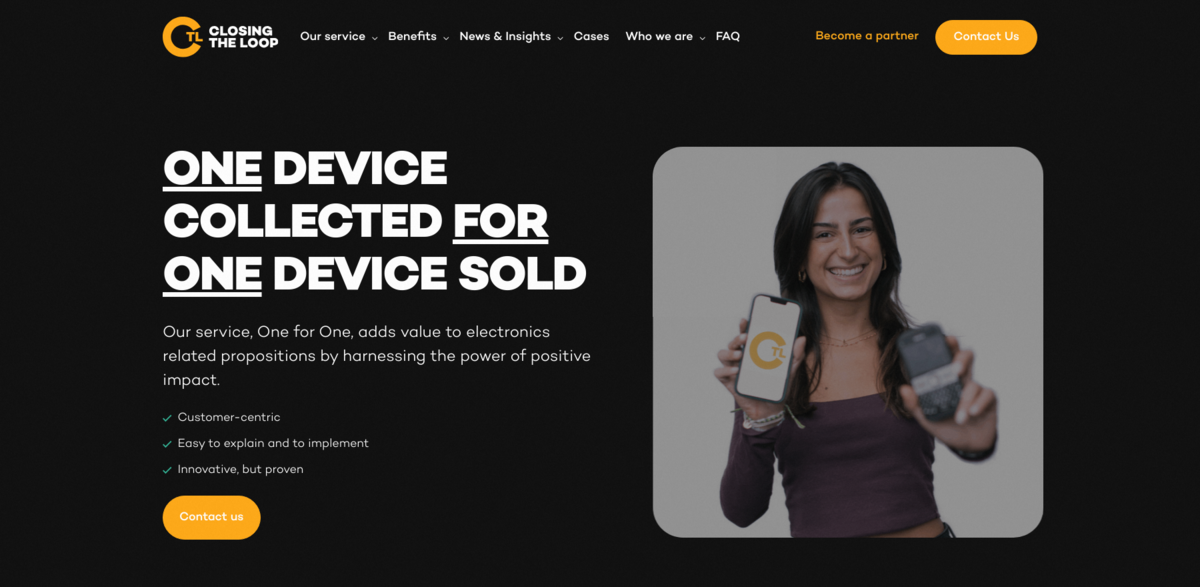What is the “Closing the Loop” Project?
Closing the Loop is a service that brings measurable impact to electronics-related propositions by harnessing the power of positive change. With a simple promise—one device collected for one device sold—the project enhances sustainable initiatives while injecting commercial value. It operates via its signature service, One for One, which is both innovative and proven. The project is built on common-sense principles: collect and recycle a device once a new one is added to the market, ensuring each new piece of technology leads to an equivalent reduction in electronic waste. This approach not only supports sustainability but also serves as an easy-to-explain and customer-centric enhancement for electronics purchases.
Main Benefits and Key Figures
The benefits of the service extend across several important aspects:
- Customer-centric approach – making devices better aligned with organizational values.
- Easy to explain and implement – a seamless add-on to existing contracts with suppliers.
- Innovative, yet proven – with over seven years of experience in Europe, the United States, and Asia.
- Creates measurable impact – ensuring that every new phone, tablet, or laptop is offset by responsible recycling.
- Fast implementation with reportable results – detailed certificates validate every reduction in electronic waste.
Service Overview: One for One
The heart of Closing the Loop lies in its One for One service. A new electronic device added to the market triggers the collection and recycling of a scrap device—a process that ensures electronic waste is effectively counterbalanced. The idea is straightforward and intuitive: the way electronics are sold and delivered does not change, but with each new device, there is a thoughtful follow-on action. A small fee is charged per new device sold, and in return, a scrap phone, tablet, or laptop is collected, recycled, and its impact is certified. This easy-to-implement method creates marketing and commercial value while supporting sustainability…
Implementation Process and Simplicity
The implementation of the One for One service is refreshingly simple. Organizations do not need to change their existing purchasing habits, contracts, or vendor relationships. Instead, the process is designed to integrate effortlessly into current operations. When a new phone, tablet, or laptop is launched, a small additional fee is charged to add the recycling and waste reduction benefit. Through this process, each new device leads directly to the reduction of electronic waste, with every step reportable by certificate. This vulnerability-free, low cost, and risk-free method makes it an ideal first step towards a greener and more circular use of electronics… It is not just a service; it is a movement towards responsible consumption.
Case Studies and Client Success Stories
Over the years, a wide range of organizations have adopted the One for One service, leveraging its benefits to align their brands with sustainable practices. Client cases include globally recognized names such as VODAFONE, T-MOBILE, DUSTIN, KPMG NL, and the DUTCH CENTRAL GOVERNMENT. Other notable users like GIGASET, PAESSLER, and APG highlight the broad applicability and success of the service. Through these case studies, the project demonstrates its commercial effectiveness while reinforcing its commitment to environmental responsibility. Organizations have found that the service not only enhances user engagement with their products but also serves as a powerful tool for employee engagement and compelling storytelling.
Compliance and Operational Clarity
A safe and proven service stands at the forefront of the project’s promise. All compliance questions have been addressed with rigor and clarity. With certification from a leading NGO for sustainable IT in 2020, the service guarantees that electronic waste is managed responsibly. The approach of linking every new device sold to the collection and responsible recycling of a waste device ensures that every partnership remains auditable and fully reportable. The transparent process also alleviates concerns about contract modifications, as the service easily integrates with existing supplier terms. This operational clarity has made the service extremely attractive to a variety of organizations.
Project Impact: Sustainability and the SDGs
- SDG 12: Responsible Consumption and Production – ensuring devices are used in a sustainable, circular manner.
- SDG 13: Climate Action – reducing electronic waste contributes to lower carbon footprints.
- SDG 9: Industry, Innovation, and Infrastructure – innovative practices that improve waste management systems.
- SDG 8: Decent Work and Economic Growth – creating positive impacts such as job creation and improved environmental standards.
Frequently Asked Questions and Operational Insights
The project answers several frequently asked questions that ensure clear operational insights. For instance, the concept of compensating devices means that every new electronic device initiates a linked process which sees an equivalent amount of electronic waste being collected and properly recycled. This is particularly important in regions like Africa where formal waste collection is lacking. The increased waste reduction is used to compensate for new devices, thereby creating a waste-neutral process. Further questions address why a service like this makes devices more appealing: it aligns perfectly with sustainable, circular values, and enhances customer and user engagement. Additionally, inquiries about the solidity of the service are met with facts such as over seven years of international experience and certification by a leading NGO. Finally, concerns about contract adjustments are alleviated by confirming that there is no need to change existing agreements with current providers or suppliers. This clarity in operational structure renders the service both transparent and efficiently accessible for any organization seriously considering greener initiatives…


















